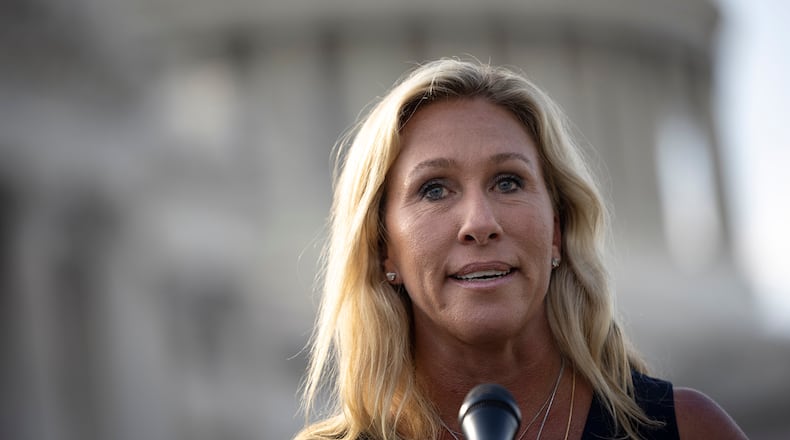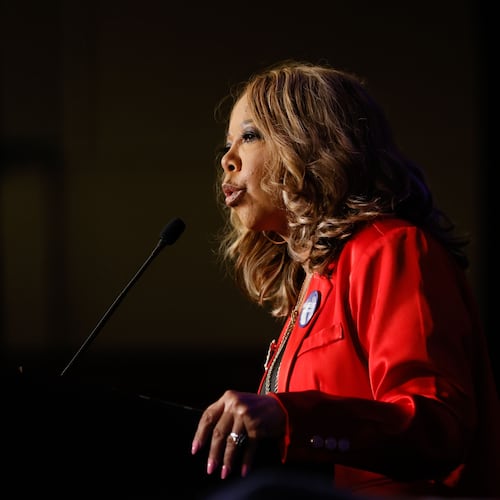Politics can seem like a game most of the time. The who’s-up-who’s-down, family-feud of it all often borders on the ridiculous.
But some days remind you that the whole point of politics is to elect sound leaders capable of seeing us through the worst of times. And on Wednesday night, with Russia’s invasion of Ukraine, the world saw a moment that felt like it could be the start of the worst of times.
It’s hard to overstate how dangerous this moment is to the entire world order, which has been more or less stable since the end of World War II. An unrestrained Vladimir Putin atop a nuclear-armed Russia, invading the second-largest country in Europe, is fulfilling the West’s worst nightmares of the post-Cold War era.
Politicians’ reactions in a crisis can sometimes tell you more than you’ll learn in an entire campaign. Are they serious? Are they substantive? Are they focused on their country, their party, or themselves? Is this person up to the job they have or say they want?
But unlike the days after the attacks on 9-11, when Americans united against our outside dangers, the reactions to the news out of Ukraine this week have ranged from sober and responsible to worrisome and even reprehensible.
One of the first to respond to the invasion came before dawn Thursday morning from Gov. Brian Kemp. Although a governor isn’t the first person you think of when one country invades another, Kemp oversees the Georgia National Guard and the Air National Guard, which have been tasked repeatedly with overseas military deployments over the last two decades.
“As Putin and the Russian army violate Ukraine’s sovereignty through this callous, indefensible invasion, we stand with our allies and condemn this aggression of tyrants,” Kemp wrote in a statement. The governor said he was cognizant of Georgia’s servicemembers, who would go to heightened alert, and praying for the safety of Ukrainians and “all who fight for liberty around the world.”
For Kemp it was a moment of leadership where it wasn’t necessarily required, and it set the tone, especially in Georgia, that Putin is the enemy in this scenario, not President Joe Biden.
U.S. Rep. Austin Scott is likely to be one of the Georgians most directly engaged in the crisis over the next weeks and months. His middle Georgia district includes Robins Air Force Base and he’s a senior Republican member of the House Armed Services Committee. While that sounds esoteric when you’re watching from home, the role gives Scott unique visibility into the rather terrifying issues that could spin off of this crisis.
The congressman had just attended the NATO Parliamentary Assembly in Brussels as the invasion began Wednesday night. Crucially. When he returned from Belgium, he said in a statement he was “disgusted” by the unnecessary loss of life because of Putin’s’ actions.
“Innocent people are dead in Ukraine due to power-hungry Vladimir Putin’s obsession with recreating the former Soviet Union.”
Scott will be a key figure to watch and another one whose approach to Russia has been as serious as the new reality we’re facing.
Georgia’s two U.S. senators, both Democrats just a year into their jobs, were each in Georgia for the congressional recess this week as the events unfolded and prepared Thursday for an all-senators briefing from the State Department on the state of play following Russia’s initial assault.
Warnock’s team was in touch with the Defense Department to learn which Georgia additional units might be activated to support NATO allies. And he and Ossoff both spoke out to support sanctions against Russia and condemn Putin in the strongest possible terms. Warnock had voted earlier for a bill from Ted Cruz that would have imposed sanctions on Nord Stream 2, the company building a pipeline to deliver Russian natural gas to Germany.
U.S. Rep. Buddy Carter, a Republican from Pooler, also hammered Putin, calling him “the enemy of freedom,” and asked Biden to fulfill his duty as commander in chief. “Congress stands at the ready to support,” Carter wrote. Carter’s vote of support for the president, even when he’s disagreed with Biden in the past, was important to note.
Government officials I spoke with warned that the weeks ahead could see a spike in global gas prices, food shortages, and supply chain and trade disruptions that only intensify.
More to the point, the threat of further incursions into Europe, including NATO allies, is more real than any other time since World War II.
But no challenge to the United States externally may be as serious as the ones inside our own borders. As Biden urges NATO to put on a united front, we’re failing to do the same at home.
At the very moment Russian troops were invading Ukraine Wednesday night, Donald Trump told cheering donors at his “Magapallooza” fundraiser, “This would never have happened if the election weren’t rigged. It was a totally rigged election.”
The fundraiser was for House and Senate candidates, including Herschel Walker. Trump again praised Putin for his incursion to the west.
“He’s taking over a country for $2 worth of sanctions. I’d say that’s pretty smart,” Trump said.
Like a chorus, the politicians who feed off of Trump’s supporters for their own survival echoed Trump’s words, criticizing only the American president — never Putin — for the advancing Russian troops.
“Everything happening to the poor people of Ukraine is a direct result of a WEAK America under the WEAK leadership of Joe Biden,” Rep. Majorie Taylor Greene wrote as part of a lengthy statement. “Under President Trump, America was STRONG and the world was at PEACE.”
Likewise, former Sen. David Perdue called Biden weak and told a local radio station, “This wouldn’t have happened with Donald Trump as president.”
Ironically, the fastest way to strengthen Biden’s hand internationally would be for Americans to be united as a country.
Crises have a way of revealing leadership. And we’re seeing in real-time who is up to the jobs they have and, in this campaign season, who is ready for the jobs they want.
About the Author
Keep Reading
The Latest
Featured




